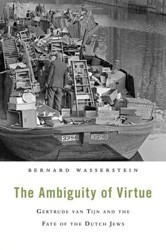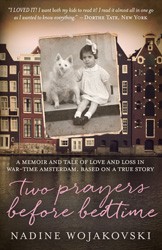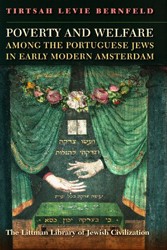By
– September 1, 2011
Ashes in the Wind is Dr. Jacob Presser’s classic account of the Holocaust in the Netherlands. First published in 1965, the book has not been available for many years and is now re-issued in a new paperback version with a special afterward by historian Dienke Hondrus of Amsterdam University and staff member of the Anne Frank House, Amsterdam.
Presser’s book is recognized as one of the early works on the Shoah, predating the plethora of books that began to appear in the 1970’s. It chronicles the tragic story of the 140,000 Jews who lived in the Netherlands in 1940. Over 110,000 were deported to concentration camps and of those under 6,000 survived. Presser’s life mirrored that history. He was a Dutch Jew who survived in hiding for two years in the Netherlands; his wife, Deborah, was deported and killed in Sobibor. After the war he spent over a decade researching the book using the vast archival holdings in the Dutch National Institute for War Documentation. The book was a great commercial success, notwithstanding its harsh criticism of the Dutch people. He recounted the indifference and silent conformity of the Dutch people, challenging the image they had of themselves as resisters of the Nazis and courageous friends to the beleaguered Jews. He prompted much introspection and future research.
When first published, the book was criticized in some circles for being too emotive, for writing history from the perspective of the victim and for being too harsh. The book, however, has weathered the test of time. Much of its evidence and assertions remain credible and important, even as more recent scholarship has suggested nuanced interpretations of such issues as the role of the Jewish councils, for example. It was a monumental achievement in 1965 and it remains so today, re-opening a window into the process of dehumanization, passivity, and complicity that allowed the Holocaust to happen.
Presser’s book is recognized as one of the early works on the Shoah, predating the plethora of books that began to appear in the 1970’s. It chronicles the tragic story of the 140,000 Jews who lived in the Netherlands in 1940. Over 110,000 were deported to concentration camps and of those under 6,000 survived. Presser’s life mirrored that history. He was a Dutch Jew who survived in hiding for two years in the Netherlands; his wife, Deborah, was deported and killed in Sobibor. After the war he spent over a decade researching the book using the vast archival holdings in the Dutch National Institute for War Documentation. The book was a great commercial success, notwithstanding its harsh criticism of the Dutch people. He recounted the indifference and silent conformity of the Dutch people, challenging the image they had of themselves as resisters of the Nazis and courageous friends to the beleaguered Jews. He prompted much introspection and future research.
When first published, the book was criticized in some circles for being too emotive, for writing history from the perspective of the victim and for being too harsh. The book, however, has weathered the test of time. Much of its evidence and assertions remain credible and important, even as more recent scholarship has suggested nuanced interpretations of such issues as the role of the Jewish councils, for example. It was a monumental achievement in 1965 and it remains so today, re-opening a window into the process of dehumanization, passivity, and complicity that allowed the Holocaust to happen.
Michael N. Dobkowski is a professor of religious studies at Hobart and William Smith Colleges. He is co-editor of Genocide and the Modern Age and On the Edge of Scarcity (Syracuse University Press); author of The Tarnished Dream: The Basis of American Anti-Semitism; and co-author of The Nuclear Predicament.





